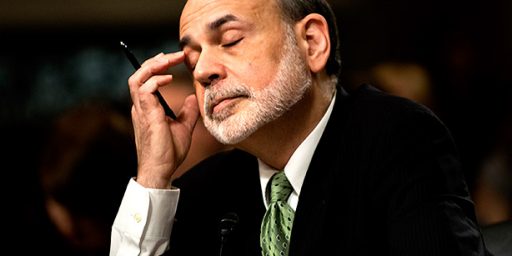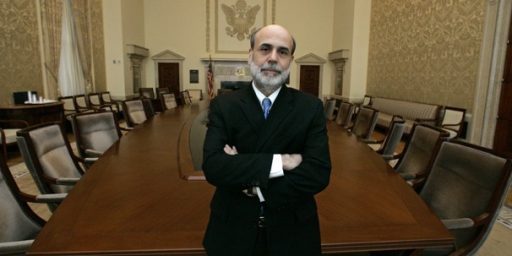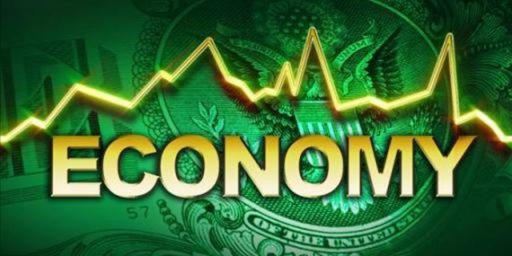Jeffery Sachs on Fiscal Policy
Is the current approach to fiscal policy misguided, if well intentioned? That is the case Jeffery Sachs is making.
The U.S. political-economic system gives evidence of a phenomenon known as “instrument instability.” Policy makers at the Federal Reserve and the White House are attempting to use highly imperfect monetary and fiscal policies to stabilize the national economy. The result, however, has been ever-more desperate swings in economic policies in the attempt to prevent recessions that cannot be fully eliminated.
President Barack Obama’s economic team is now calling for an unprecedented stimulus of large budget deficits and zero interest rates to counteract the recession. These policies may work in the short term but they threaten to produce still greater crises within a few years. Our recovery will be faster if short-term policies are put within a medium-term framework in which the budget credibly comes back to balance and interest rates come back to moderate sustainable levels.
Looking back to the late 1990s, there is little doubt that unduly large swings in macroeconomic policies have been a major contributor to our current crisis. The lessons of the high inflation of the 1970s had supposedly chastened policy makers against trying to fine-tune the economy. The quest for never-ending full employment had contributed to high inflation in that decade, which required years of economic pain to wring out of the system. Monetary policies thereafter were supposed to be “steady as she goes,” not trying to smooth out every fluctuation and business cycle in the economy.
That was indeed the prevailing attitude. The problem is that the financial crisis at home has changed the attitudes in favor of those who think the economy is like a car engine and the government is at the whell controlling not only the direction, but also the gas and break pedals (hence metaphors like “jump starting the economy”).
During the decade from 1995 to 2005, then-Federal Reserve chairman Alan Greenspan over-reacted to several shocks to the economy. When financial turbulence hit in 1997 and 1998—the Asian crisis, the Russian ruble collapse and the failure of Long-Term Capital Management—the Fed increased liquidity and accidentally helped to set off the dot-com bubble. The Fed eased further in 1999 in anticipation of the Y2K computer threat, which of course proved to be a false alarm. When the Fed subsequently tightened credit in 2000 and the dot-com bubble burst, the Fed quickly turned around and lowered interest rates again. The liquidity expansion was greatly amplified following 9/11, when the Fed put interest rates down to 1 percent and thereby helped to set off the housing bubble, which has now collapsed.
To be sure the low interest rates weren’t the only cause of our current problem, but their historically low levels were likely what got the balling rolling. Alan Greenspan apparently became enchanted with the notion that the Fed could pursuse counter-cycle policy despite evidence that this has not produced very good outcomes.
Sachs then points out why parallels to the Great Depression are out of line, obviously Matthew Yglesias will be writing a post shortly telling us how Jeffery Sachs is nucking futs.
There is little reason to fear a decade of stagnation, much less a depression. The U.S. economy is technologically dynamic and highly flexible. The world economy has tremendous growth potential if we don’t end up in financial and trade conflict, and if the central banks ensure adequate liquidity to avoid panicky runs on banks, businesses and sovereign borrowers. We should understand that the Great Depression itself resulted from a horrendous run on the U.S. banking system in an era without deposit insurance, and when the Fed and Congress did not understand the critical role of a lender of last resort. Moreover, the Gold Standard of the 1930s, which we long ago abandoned, acted like a kind of straightjacket on monetary policies.
This is exactly right. Furhter government expenditures prior to the Great Depression were much smaller and there was no such thing as unemployment benefits. Both of these act to some degree as automatic stabilizers. The spending by the government would have likely changed very little even absent any fiscal spending stimulus. The resulting deficits would have been the result of a fall in tax revenues. And provided Team Obama themselves don’t go nucking futs and go down that idiotic “Buy American First” road again we wont have the Smoot-Hawley style tariffs that added to the Great Depression.
However, I think that the large amounts of spending that is currently being proposed, voted on and passed could cause problems in the medium to long term. Since everyone is focused almost solely on the immediate/short run nobody is keeping in mind our already large fiscal commitments to Medicare and Social Security. Combined these pose significant budgetary problems for the U.S. The higher taxes and/or interest rates they would require would act as a drag on the economy and thus ensure sub-optimal growth for years, maybe even a full decade.
Via Greg Mankiw.






Nobody except a little known politician with a strange name.
Bernard beat me to it. Moreover, it ain’t gonna be easy. Jokers to the left of him, Clowns to the right. (And, yeah, I know.)
This is exactly the same explanation of our current crisis given by Peter Schiff in “Crash Proof” and although other predictions of his have not come to fruition, I completely agree with this part and wonder why this isn’t obvious to more people.
I will wait to see the plan. At this point, I’m not very hopeful.
Oh, and talk about being behind the curve there Bernard, I think Obama is way late to this game. His dopey answer during the debates only underscores this…he is making up a plan right now.
I’ll also add Bernard, that I think if people had gone with your intial view of this financial crisis and recession we would not see Obama talking about the longer term fiscal problems. The idea that we need not worry about debt for the next several years (a la Krugman) has been shown to be in error. I’ll note that back September of 2008 I was bringing up the issues of Social Security and Medicare.
Late or not, he’s talking about it prominently. That’s my only point. As inconvenient as it is to your posture of endless outrage at all things Obama, the fact is, he seems to want to address the issue. We could perhaps give him the benefit of the doubt before tearing him apart. Or you know, try to engage him and his supporters on it rather than turning it into just a pretext for cheap attacks.
Lol, I just made a funny. Modern conservatives engaged in real discussion rather than political theater? When will I learn?
You mean like when Dick Cheney said “Deficits don’t matter”?
And, when have I ever… ever… suggested that debt is not a problem? Indeed, MY diagnosis of the financial crisis was that it was in particular the combination of financial collapse AND fiscal constraints that made this recession a real threat because it meant that short-term governmental counter-cyclical measures would likely lead to a long-term hangover… and that is why, btw, I remain pessimistic about a long-term recovery. Even where we dig out of this current recession, we’re going to need to adopt some very painful adjustment policies to restore our fiscal health… which is why my prediction about the recession was that it would be deep, followed by a shallow recovery, followed by another deep down-turn.
“The liquidity expansion was greatly amplified following 9/11, when the Fed put interest rates down to 1 percent and thereby helped to set off the housing bubble, which has now collapsed.”
A question for Steve, or anyone really. Given that the Case Schiller index, after being basically flat for years, took off on a meteoric rise beginning in 1996, why the fascination with events in the 2000’s?? Greenspan may have poured gasoline on the fire, but isn’t it correct to ask what happened in the mid 90’s to “set off” home prices??
“Lol, I just made a funny. Modern conservatives engaged in real discussion rather than political theater? When will I learn?”
You were saying something about cheap attacks?
They are not cheap when I make them. When I attack people, I am engaged in either (a) superbly witty satire or (b) rich philosophical discourse. And sometimes both!
Bernard,
Actually I think it is fair to say he is talking about it now. I wouldn’t add prominently unless he keeps it up and something serious comes out next month.
Frankly I think he is late to the game. He should have addressed the issue earlier and IMO he was clueless and unprepared. His half-assed dodge during the debate with McCain showed this.
As for the cheap attacks, I’m sorry have you read the people who support Obama? Krugman, DeLong and Yglesias? They have all been not just engaging in cheap attacks but acting like downright…well lets say finishing that sentence would likely have James editing part of my comment.
And you’ll forgive me Bernard if I still think your position is that the medium to long term isn’t that important. You were the one arguing against me everytime I pointed out the magnitude of the stimulus plans, bailouts, etc. Your position, for most of the past several months can be summarized as: lots of spending is absolutely necessary. Nothing about the medium to long term.
Note to the knee-jerk liberals: Yes McCain’s answer wasn’t any better, but to paraphrase Obame, Obama won, he’s the guy on the hot seat so pointing to McCain’s lame answer is not only lame, but moronic.
Drew,
I don’t know, I’ve found some data on the internet and overall it looks like a steady if exponential rise starting in the early 1990’s. The first part looks mild…maybe the end of the recession…dot.com bubble? I dunno. In later years it does look crazy.
My position has been that it is likely a necessary evil and that the arguments against the stimulus package ought to be “the cure is worse than the disease” (which seems to be your current position) rather than “this recession isn’t so bad” (which is what you clung to for the longest time).
I was, am, and will be agnostic on the stimulus concept. I don’t much like it… but I am not sure I can stomach the risks of doing little or nothing either. I don’t know what the right answer is. Though I am pretty sure a capital gains tax cut and a permanent extension of Bush’s tax cuts for the wealthy is not the right answer. So, ultimately, I am supporting the Democratic plan which may very well be wrong instead of the Republican plan which I know is wrong.
Steve –
“I don’t know, I’ve found some data on the Internet and overall it looks like a steady if exponential rise starting in the early 1990’s.”
I guess its my former life as an engineer. I’ll use an example based in military time. If I was back in the steel mill, and I was monitoring a process, and a gage, say a water pressure gage on the continuous caster…if it took off with new and higher readings starting at 19:96. And if it steadily increased until 20:03. And then if the process eventually blew up at 20:07, I just wouldn’t be that interested in explanations based on events at 20:03, 20:04. At best those are contributing events. But I’d be looking for root causes. And something started in the mid-90’s in housing.
I have a view. But it regularly gets shouted down by the partisans.
I’ve been having a similar go-round with Bernard on government spending. He is focused on recent events; recent Presidencies or Congresses..Bush, Reagan etc. However, I look at our spending behavior, deficits etc over a long period of time, beginning with this inflection point in the mid-60’s off of a ten year period of stability. There is simply no denying that in the mid 60’s, with some fluctuations, spending and deficits took off. Again, engineer Drew says: “what was going on then that still pertains today.”
I think I know. The Great Society.
Get it right for God’s sake. It isn’t as bad as many are making it out to be. At least that is what the most current data is saying.
There are two routes:
1. Permanent tax cuts.
2. Increased spending and hope for a multiplier effect.
Both have an issue of timing as well. Getting more money into people’s hands a year from now likely wont be as useful as getting it into people’s hands now. The lag associated with fiscal policy though is real and is one reason why for decades most economists looked to monetary policy.
I happen to think both plans are wrong. There are more than tax cuts for the top of the income distribution and capital gains.
And mind you, none of this addresses the issue with the financial sector. Funny how you’ve forgotten that.
Drew:
Sorry for the delay in getting my numbers up. If you can still claim that you see inflections beginning in the 1960s and continuing unabated, then fine… but if you’re honest you wont. Will be posted tomorrow on bernardfinel.com. Just finishing off charts today.
Steve:
Financial sector… I’ve given my thoughts on that in other posts… I favor allowing the insolvent banks to fail and creating new clean lending institutions to be privatized as quickly as possible to fill the lending gap.
Oh and Bernard, “next month” is almost over by the way. I didn’t notice the date on that article, but it was January 7th. I think giving him till the end of February is reasonable. So are we going to see something this week? I’m thinking not.
Hmmm,
Wonder when that will happen? I’m going to go out on a limb and guess, never.
Really? It hasn’t occured to him that we have an excess supply of housing and that prices simply have to adjust downwards to accomodate to this fact. Oh, I know! Lets take a page from FDR/the New Deal and destroy those homes!
Drew,
In looking at government spending, debt, and deficits, I think that right after WWII there was a strong desire to reign in government spending. After all a huge amount of GDP was government spending on the war effort. People were sick of it. Fortunately there was likely a fair amount of pent up consumer demand and with all the rationing a fair amount of money as well. So we didn’t head back into a depression after the war.
But something had changed. Both inside academic economics and government there was this belief that the government could minimize if not eliminate the business cycle via government policies. Then came the Great Society which relied on the reversal of interpretation of the Commerce Clause allowing for very large government spending (relative to the past). Since then politicians have been addicted to deficits. Weening them off of it has been very hard.
Granted it has been done, and Clinton should get at least a goodly share of the credit for the last time. The the general rule is deficits not surpluses. I think that the political will to rescind much of this spending wont be there. And with Social Security and Medicare starting to make larger and larger demands taxes will have to go up.
As for housing, I don’t know, but if Sach’s timeline is correct maybe it was part of the dot.com bubble. All that extra money started to show up in housing prices going up. I don’t know just guessing. Then when that popped and interest rates were brought to historic low levels it added fuel to the fire and prices really took off. We can probably add on ancillary effects of Freddie and Fannie, and CRA and other political aspects to the problem making it worse.
Oh…hmmm, Obama is going to spend an extra $15 billion on Medicare starting this Wednesday.
Bernard –
I’m always honest. And I’ll look. But I have in front of me (BEA) as I type a graph of US debt to GDP that distinctly heads upward and onward starting at 1966, accelerating just about all the way.
I also have a graph in front of me (BEA) that shows that Fed spending as % of GDP is basically unchanged for the decade +2 of 1953 to 1965 at about 16%-17%. And then we start drifting upwards. In light of my previous commenst that defense spending drifted down from about 11% in 1965 to 4% today…………that’s an ugly and unsustainable picture for non-defense spending.
By the way, when you add state/local to Fed, you have government spending and taxing rising from 20% to 30% in the post WWII era. 30%??? And that’s not enough?
Steve –
I’m weak. I can’t resist. This argument usually resonates…..not!! But…….Cliff’s notes version. (Remember: I’m a lender in the mid 90’s. I lived this. I’m right.)
Mid 90’s. HUD social policy says: More home ownership is good, creditworthiness be damned. Lend or be prosecuted, a-holes. Lenders respond (rationally): OK. You want me to make bad home loans? I want them off my balance sheet. Lobbying ensues. Hence: Freddie.
Private market loan originators observe events and say say (in a progressive context of speculation and easy credit): “Wait a minute. What are those guys doing??? Let me get this straight. I can make crappy credit decisions, crappy loans for bad borrowers in overpriced houses, but then sell the mortgages off my balance sheet? I could make a fortune!! Sign me up!!” Wall Street says: “Your wish is my command. I can syndicate.”
And off we go. Real estate is the “no lose” investment of the day……and even internationally!!! The classic feeding frenzy bubble.
Back to my “Drew the root cause guy” stuff. I’ve been an extender or everyday user (LBO guy) of credit for 18 years now. I’ve seen how credit cycles work. It always starts with (with varying rationale) excuses for extending bad credit. In fact, this has been true for centuries.
So when I see “blame Bush regulation.” Fine. Blame Greenspan easy money. Fine. Blame Wall Street greed. Fine. Blame mortgage originators, fine………
I say: Absolutely inane observations, and total crap……on your logic.
The issue was easy credit in pursuit of a social policy, people. Root causes!!
You violated credit 101. How do you get paid back, Mr Lender????? The very same root cause of every credit bubble in the history of the world.
End of sermon…….
If it were up to me we’d spend a lot less, believe me. But it isn’t. And since it isn’t, I feel very strongly that we should not be living beyond our means and passing the costs along to our children. The fiscal policies of the Reagan, Bush, and Bush Administrations are simply immoral. If you want to cut taxes, you HAVE to have the guts to pass spending cuts. And once you realize that you can’t pass spending cuts because programs like Social Security are genuinely popular then simple decency requires you to raise taxes to a level that pays for spending. That is not a liberal argument. It is a traditional conservative argument that you have to pay your bills.
Anyway, my point is not that we spend too little… my point is that social spending is not “runaway” with the significant and notable exception of health care costs.
“And once you realize that you can’t pass spending cuts because programs like Social Security are genuinely popular then simple decency requires you to raise taxes to a level that pays for spending.”
This is truly pathetic logic, even for Bernard.
And once you realize you can’t pass cuts for truly genuinely popular programs like free ice cream, or free health care, or free mortgages, or free car insurance or free beer, or free pizza……..or free anything an enterprising politician cant’s sell……..tax away!!!!!!
Mind numbingly stupid, Bernard. Really, really stupid. By the way…..out of simple decency, I’ve decided to confiscate 100% of Bernard’s salary for the next 4 years to pay for a neighbor’s kid’s college education. Good kid. And he’s “popular.” And I’ve decided its a good cause.
I know Bernard will understand. After all, he “cares” and understands that “popular” causes must be funded.
BTW – don’t be surprised when Bernard the Decent runs for the hills on this………snicker
How do we square this “its popular so the only decent thing is to raise taxes” with the hugely unpopular bailout.
Oh and as the saying goes, if you are going to rob Paul to pay Peter and Patrick you can always count on the support of Peter and Patrick. Does whitewashing it with the patina of democracy and a majority make it right?
Argumentum ad populum doesn’t strike me as very persuasive Bernard.
Drew:
We live in a democracy. In a democracy, you have to account for the will of the people. If people want to have Social Security, you have to pay for it.
I was not saying that any one individual should be able to seize another’s assets. I was saying that if the democratic process yields a particular policy, it is irresponsible not to pay for it.
I was not suggesting that you stop arguing against it. I was not suggesting that you stop trying to convince people that it is too expensive. I was not suggesting rolling over in any way.
I was just saying that the government — like any other person or business or institution — has an obligation to pay its bills.
Is that really such a controversial statement that I deserve to be called stupid because of it?
Really? Someone has to be pay the bill. The question is whether it is us — who are running them up by electing the people we do — or our children who are too young to vote.
What am I missing?
–BF
We also have the SCOTUS which can say, “No, that is against the principles of good government we have in the Constitution and therefore even though Robbing Peter to pay Paul and Patrick is popular you can’t do it.”
No, but so long as we are talking about one group seizing anothers groups assets well than that’s fine.
So, it would be irresponsible/immoral to not pay for a policy for say…locking up gay people with HIV?
The problem is, despite your claims to be a small “l” libertarian, you are sounding very much like a progressive who sees no problem with the expansion of government so long as it has the popular support of the people. The problem is that you can very easily end up with unsustainable programs–e.g. Medicare.
Bernard –
First, apologies about the “stupid.” Emotions, you know. Sorry.
But look, just saying we live in a democracy so we have to roll over and take it just doesn’t seem sufficient. I could bring out the old slavery saw.
Just look at the current credit calamity. Do we say, well, its a democracy……..so whatever?
I could go on. I will. Do you believe that the voting process of this democracy has been given the facts upon which to make sound judgments? I don’t. We primarily have fraudulent appeals to base instincts. Shamefull. No leadership. Just pandering to the democratic mob.
Enough, I feel myself getting worked up again.
I believe the “will of the people” is just a variant of the “might makes right” argument. Not very principled. The Founding Fathers were quite wary of the tyranny of the majority, no matter how noble they might imagine their cause to be.
Charles –
Better said.